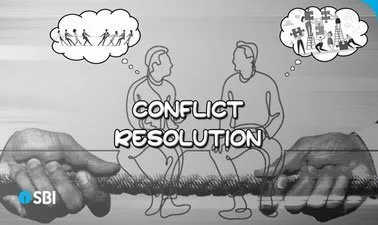
Managing conflict and polarization in the workplace and beyond 
This course, delivered by Jesus College in the University of Cambridge, will help you understand and manage conflict and polarization in the workplace and beyond. Drawing on expertise from renowned speakers in business, behavioral science, and politics, you will learn about the triggers of division that activate our ‘groupish’ instincts, and how they can lead to problematic polarization. You will gain the skills to bridge divides when they occur, and understand your role in this phenomenon. With this course, you will be able to master your own behavior and guide others to find common ground. ▼
ADVERTISEMENT
Course Feature
![]() Cost:
Cost:
Free
![]() Provider:
Provider:
Edx
![]() Certificate:
Certificate:
Paid Certification
![]() Language:
Language:
English
![]() Start Date:
Start Date:
Self paced
Course Overview
❗The content presented here is sourced directly from Edx platform. For comprehensive course details, including enrollment information, simply click on the 'Go to class' link on our website.
Updated in [May 25th, 2023]
Welcome to the course "Managing Conflict and Polarization in the Workplace and Beyond"! In this course, we will explore the triggers of division that activate our ‘groupish’ instincts, and how they can lead to problematic polarization. We will learn how to bridge divides when they occur, and understand the often-hostile consequences of our natural human instincts to form groups. We will also gain a better understanding of our role in this phenomenon, and how we can guide others to find common ground.
This course will provide an overview of the triggers of division that activate our ‘groupish’ instincts, and how they can lead to problematic polarization. We will learn how to bridge divides when they occur, and understand the often-hostile consequences of our natural human instincts to form groups.
Possible Development Directions: We will gain a better understanding of our role in this phenomenon, and how we can guide others to find common ground. We will also explore the potential for developing strategies to manage conflict and polarization in the workplace and beyond.
Related Learning Suggestions: This course will provide an opportunity to learn from renowned speakers in business, behavioral science, and politics. We will also gain insights into the potential for developing strategies to manage conflict and polarization in the workplace and beyond. Additionally, we will explore the potential for developing strategies to manage conflict and polarization in the wider society.
[Applications]
The application of this course can be seen in the workplace, at home, and in wider society. Professionals can use the skills and knowledge gained from this course to better manage conflict and polarization in the workplace, while community leaders can use it to bridge divides and find common ground. Additionally, individuals can use the course to better understand their role in the phenomenon of polarization and how to master their own behavior.
[Career Paths]
1. Conflict Resolution Manager: Conflict resolution managers are responsible for resolving disputes between individuals or groups in the workplace. They use a variety of techniques, such as mediation, negotiation, and arbitration, to help parties reach a mutually beneficial agreement. Conflict resolution managers must have excellent communication and problem-solving skills, as well as a deep understanding of the dynamics of conflict. As the workplace becomes increasingly diverse and complex, the demand for conflict resolution managers is expected to grow.
2. Diversity and Inclusion Manager: Diversity and inclusion managers are responsible for creating and implementing strategies to promote diversity and inclusion in the workplace. They work with employers to ensure that all employees are treated fairly and with respect, regardless of their background or identity. They also work to create a workplace culture that is welcoming and inclusive of all employees. As the workplace becomes increasingly diverse, the demand for diversity and inclusion managers is expected to grow.
3. Social Media Manager: Social media managers are responsible for managing a company’s social media presence. They create content, monitor conversations, and engage with customers on social media platforms. They must have excellent communication and problem-solving skills, as well as a deep understanding of the dynamics of social media. As social media continues to grow in importance, the demand for social media managers is expected to grow.
4. Community Engagement Manager: Community engagement managers are responsible for building relationships between a company and its local community. They work to create a positive image of the company in the community and to build trust and loyalty. They must have excellent communication and problem-solving skills, as well as a deep understanding of the dynamics of community engagement. As companies become increasingly focused on community engagement, the demand for community engagement managers is expected to grow.
[Education Paths]
1. Bachelor's Degree in Conflict Resolution: A Bachelor's Degree in Conflict Resolution is a great way to gain the skills and knowledge needed to manage conflict and polarization in the workplace and beyond. This degree program typically covers topics such as negotiation, mediation, communication, and problem-solving. Students will learn how to identify and address the root causes of conflict, as well as how to develop strategies to resolve disputes. This degree is becoming increasingly popular as organizations recognize the need for professionals who can help them navigate difficult conversations and disputes.
2. Master's Degree in Organizational Leadership: A Master's Degree in Organizational Leadership is a great way to gain the skills and knowledge needed to lead teams and organizations through difficult conversations and disputes. This degree program typically covers topics such as team dynamics, organizational culture, and change management. Students will learn how to create an environment of trust and collaboration, as well as how to develop strategies to manage conflict and polarization. This degree is becoming increasingly popular as organizations recognize the need for professionals who can help them navigate difficult conversations and disputes.
3. Doctorate in Conflict Resolution: A Doctorate in Conflict Resolution is a great way to gain the skills and knowledge needed to manage conflict and polarization in the workplace and beyond. This degree program typically covers topics such as negotiation, mediation, communication, and problem-solving. Students will learn how to identify and address the root causes of conflict, as well as how to develop strategies to resolve disputes. This degree is becoming increasingly popular as organizations recognize the need for professionals who can help them navigate difficult conversations and disputes.
4. Master's Degree in Social Psychology: A Master's Degree in Social Psychology is a great way to gain the skills and knowledge needed to understand the psychological and social dynamics of conflict and polarization. This degree program typically covers topics such as group dynamics, social influence, and intergroup relations. Students will learn how to identify and address the psychological and social factors that contribute to conflict and polarization, as well as how to develop strategies to reduce and manage these issues. This degree is becoming increasingly popular as organizations recognize the need for professionals who can help them navigate difficult conversations and disputes.
Course Provider

Provider Edx's Stats at AZClass
Discussion and Reviews
0.0 (Based on 0 reviews)
Explore Similar Online Courses

Azure Application Deployment and Management

Google Sheets for Beginners: The Complete Sheets Bootcamp

Python for Informatics: Exploring Information

Social Network Analysis

Introduction to Systematic Review and Meta-Analysis

The Analytics Edge

DCO042 - Python For Informatics

Causal Diagrams: Draw Your Assumptions Before Your Conclusions

Whole genome sequencing of bacterial genomes - tools and applications

Introduction to Conflict Management

Conflict Resolution

Mediation and Conflict Resolution
 Related Categories
Related Categories
 Popular Providers
Popular Providers
Quiz
 Submitted Sucessfully
Submitted Sucessfully
1. What is the main purpose of this course?
2. What type of expertise is used in this course?
3. What will you learn from this course?
4. What is the purpose of this course?
Correct Answer: To help understand why and how polarization happens and to give the skills to bridge those divides when they occur.


Start your review of Managing conflict and polarization in the workplace and beyond